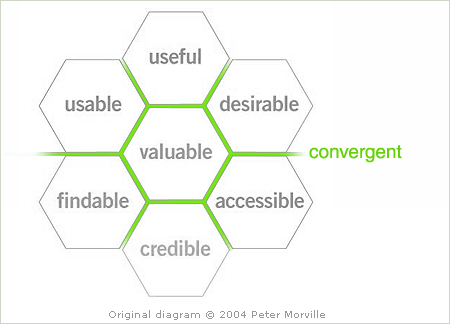In a recent post, Craig Villamor proposed "there are many business benefits to building HTML5 mobile apps, but few, if any, user experience benefits." As with all questions about design I guess... it depends.
First, we have to agree on what a "user experience benefit" is. If you've ever followed conversations about defining user experience you know that the kitchen sink is often not out of bounds. So I'm going to keep things simple and rely on Peter Morville's User Experience Honeycomb diagram as our yardstick.
Right away a few clear benefits emerge with the most notable being accessible. An HTML5 mobile app, while not accessible on all mobile devices, is at least accessible on iOS, Android, webOS, and BlackBerry 6. Most organizations don't have the development talent and/or resources to build native apps for all these mobile platforms. While that's a business issue, not having access to a service is a user experience issue.
Next let's consider findable. This one is kind of a double-edged sword because people look for services in app stores and on the Web. Not being found in either place is a user experience issue. In his great talk on Native vs. Web Apps, Jason Grigs made the point that even if you have a native app, many users will still find you through the browser (sharing, search, etc.)
Usable is also a mixed bag. The consistent controls in a Web browser (back, bookmark, email, etc.) can help aid Web application usability by maintaining a common set of predictable interactions. In native apps, these controls can be absent or implemented in widely divergent ways. Additionally, the process of keeping native apps up to date is often painful as it requires syncing and downloading each new update. On the mobile Web, apps are always up to date. This means serious (and minor) bugs can be fixed immediately sparing people of potential user experience issues.
A few other user experience benefits came out of a conversation on Twitter on this topic. Including these from Jason Grigsby:
- Support for URLs gives people the ability to interconnect and move between multiple source of information and applications.
- Performance in some mobile browsers (like mobile Safari) can actually exceed that of native apps due to optimized memory management and performance
- The combination of links and the browser's back button enables non-heirarchical navigation structures that are difficult to construct in native apps.
Most other things in Peter's Honeycomb, though seem to be a draw or have an advantage in native apps. As Phil Libin, CEO of Evernote, points out in a great article about the Mac App Store:
"...in a world of infinite software choice, people gravitate towards the products with the best overall user experience. It’s very hard for something developed in a cross-platform, lowest-common-denominator technology to provide as nice an experience as a similar native app."
Business Benefits
So why do business move to mobile Web applications?
- In the case of 37signals, it's because that's what they know how to build well.
- In the case of Netflix, it's so they can continually test variations in product design.
- In the case of Facebook, it's an attempt to better manage development across multiple platforms.
- In our case, it was a incredibly fast way to rapidly prototype a new product and learn how people could use it throughout the day.
But as Craig points out... these are all business benefits.
